Executive summary
Thousands of migrants and refugees, including Syrians, Iraqis, Afghans, and Iranians, as well as Turkish, massed at Turkey’s borders with Greece, after Erdoğan let them to Europe on February 28, 2020. Free bus services from vital areas in Istanbul, especially near the municipal buildings, to the borders, was offered by the Turkish government for those who wished to travel.
Erdoğan’s decision was only hours after 33 soldiers of his army fell and 36 injured in an airstrike conducted by pro-Syrian government jet in the province of Idlib, as reported by Tukey.
On this regard, Turkey’s Minister of the Interior, Süleyman Soylu, made several statements, asserting that his country didn’t ask anyone to leave, and that everyone who left it, voluntarily left. In turn, STJ pursued statements made on this issue by Turkish officials and mayors (among them individuals affiliated with the Justice and Development Party/AKP and the Republican People’s Party Youth (also known as CHP Youth)[1], and we noticed that those declarations were systematic and they all contain explicit calls to tens of thousands of asylum-seekers to head toward the border city of Edirne, and promises to facilitate their transport there.
In the present report, we provide statements of 12 witnesses from the asylum-seekers who bounded to the Turkish-Greek land border, following Turkish officials’ statements, which promised to provide free bus services there. During a field trip in Fatih district, STJ field researcher saw dozens of asylum-seekers crowded in front of the Directorate for Migration, and learned that the Istanbul municipality, headed by Ekrem İmamoğlu from the CHP, hired buses with drivers -for money- to transfer those who wanted to cross the border to Europe, as reported by the drivers themselves.
Asylum-seekers came from all Turkish cities to Istanbul in order to head to Edirne. STJ talked to three of them who confirmed that Turkey had much facilitated their transfer to Istanbul and from there to Edirne, as they weren’t asked to present travel permissions (as is customary for the Syrians to travel within Turkey) or even Kimliks (Temporary Protection Identification Documents) at the Turkish checkpoints along the road.
Another asylum seeker told STJ field researcher that on February 29, 2020, a Turkish policeman stopped him while on his way home and asked him to present his Kimlik. For his Kimlik is registered in the city of Urfa, the policeman told him that he had to pay fine or to go back to Urfa or to head to the Turkish border with Greece.
The thousands of asylum-seekers who tried to access Greece were motivated by different causes, but they all shared a single aim of seeking a better life. Refugees met by STJ said that since they heard the Turkish officials’ statements, which allow the move toward Europe, they turned their rented houses over and sold all their belongings, preparing for immigration.
Turkish interior minister, Süleyman Soylu, declared on March 4, 2020, that more than 130.000 asylum-seekers reached the border city of Edirne, only 25% of them were Syrians. However, information and reports obtained by STJ field researcher confirmed that the real figures are much higher. It is difficult to precisely determine the numbers of asylum-seekers who have left to Edirne, especially from the city of Istanbul, given that their names, legal statuses or nationalities have not been registered by any entity.
While facilitating their access to the Greece border, Turkey prevented asylum-seekers from returning to Istanbul and other Turkish cities by force. STJ met about ten of those who failed to access the Greek territories, including women, and they all confirmed that they underwent or witnessed beatings and threats by the Turkish border guards (gendarmerie) while trying to get back to Turkey. Two eyewitnesses confirmed that the Turkish border guards used beatings to push back asylum-seekers to the Greek side after being expelled with beatings, as well, from there.
Most of the witnesses interviewed on the Turkey-Greece border reported that the Turkish gendarmerie sold rubber boats for the asylum-seekers to use them in crossing the river separating the two countries, in exchange for 100 Turkish liras from each person. While many confirmed seeing people smugglers at the border points making deals with thousands of asylum-seekers who gathered there, in full view of the Turkish border guards.
Among those asylum-seekers, STJ field researcher met Syrians who were about to obtain the Turkish nationality, and others who hold a valid Kimlik-registered in the cities they are residing-, but even so they preferred to take the risk of illegal immigration to Europe.
For its part, the Greek authorities prevented asylum-seekers from crossing into its territory, often using force, as a number of eyewitnesses and asylum-seekers who were interviewed by STJ field researcher recounted that they had been beaten, robbed, and undressed by the Greek border guards, upon their attempts to cross into Greece.
On March 6, 2020, only one day following an agreement concluded between Turkey and Russia to ceasefire in Syria’s Idlib, the Turkish Coast Guard announced preventing illegal immigrants in Turkey from crossing the Aegean Sea toward EU countries. (See the paragraph entitled: “A decision to prevent migrants from crossing the Aegean Sea after the Turkish-Russian agreement.”)
Sources reported to STJ that following the ceasefire agreement, the Turkish government started allowing the asylum-seekers massed at the Turkey-Greece border to return to the Turkish cities they dwell in. and on March 8, 2020, the Turkish government stopped the free bus services to the borders with Greece and prevented new asylum-seekers from entering Edirne, as reported by media activists who covered the situation at the borders. The activists said that many asylum-seekers preferred to return after they had lost hope in any possible way to cross into Greece, while others are still waiting at the Turkey-Greece border in order to make other attempts, as of March 17, 2020.
It is important to note that on March 18, 2016, the European Union and Turkey reached a long-term agreement to control immigration and formally issued a statement, according to which Turkey agreed to return all illegal immigrants who crossed to the Greek islands after March 20, 2016, in exchange for six billion euros in addition to political concessions from the European Union.
Methodology of the report
This report is based on a total of 12 statements obtained by STJ field researcher, between the 1st and the 8th of March. The statements were given by ten asylum-seekers and two media activists, who headed towards European frontiers after the Turkish officials’ statements which called them to do so.
STJ field researcher elaborated: three of the asylum-seekers talked about free transportation from all Turkish cities to Istanbul offered to them by the Turkish government which also facilitated their move by not asking them to issue travel permissions which they usually asked to present at checkpoints.
Another witness said that agents of the Turkish government detained him in Istanbul for holding a Kimlik registered in another city. They told him to pay a fine or go the Turkey-Greece border.
Five Syrian asylum-seekers, who failed to access Greece, said that they were forced with beatings and threats by the Turkish border gendarmerie in order to try to access Greece again.
A Syrian asylum seeker who is nominated for the Turkish nationality said that he preferred to venture to Europe instead of obtaining this citizenship.[2]
Two of the media activists, who covered the journey of the asylum-seekers to the Tukey-Greece borders in the period between February 28 and March 8, 2020, also gave valuable information.[3]
Besides, the report editor looked into open sources which reported and quoted statements and tweets of Turkish officials and mayors, which contained explicit calls for refugees to head towards the Turkish borders with Greece, as well as promises to facilitate their passage there. The editor also gathered more evidence and information on the cases documented in the report.
1. Statements with explicit calls for refugees to head toward borders with Greece
On February 27, 2020, the Turkey’s Ministry of Defense announced the death of 33 Turkish soldiers and the injury of 36 others in an air strike by Syrian government forces in northwestern Idlib.[4] It also confirmed that Turkey would continue its military operations in Syria.
As news of the strike emerged, a senior Turkish official- he requested anonymity- told Reuters on February 28, 2020: “the government had decided, effective immediately, not to stop Syrian refugees from reaching Europe by land or sea… all refugees, including Syrians, are now welcome to cross into the European Union.”[5]
These reports were reinforced by the announcement made by the Turkish president Recep Tayyip Erdoğan on February 29, 2020, in which he said that his country will always keep the doors open for refugees heading to Europe, citing that: “Turkey is already home to the world’s largest number of refugees – around 3.6 million Syrians-we are not in a situation to handle a new wave of refugees… nearly four million refugees are recently moving towards Turkey’s border with Syria due to the bloody attacks of Bashar al-Assad regime on civilians, while 1.5 million of them are already at the southern border.”[6]
Contrary to what was said by Turkey’s Minister of the Interior Süleyman Soylu to CNN Türk TV., on March 4, 2020, that Turkey had nothing to do with the flocks of asylum-seekers headed to the borders with Europe, statements of Turkish officials and mayors had clearly called immigrants and refugees to move towards the Turkey-Greece borders, offering to transport them there for free.[7]
One of those statements was made by Tanju Özcan, a member of the CHP and the mayor of the city of Bolu in northwestern Turkey. Tanju said in a video tweet he published on February 28, 2020:[8]
“Our government announced the opening of borders for refugees. We prepared a plan with our colleagues and we are committed to arranging free buses for the refugees in Bolu towards the border town of Edirne. Refugees willing to go to Edirne can apply to the Bolu municipality and its branches. We are ready to assure the transport whatever the number [of refugees] is.”

Image (1) the tweet published by the mayor of Bolu. Credit: the official Twitter account of Tanju Özcan.
This coincided with a similar declaration by Mustafa Yalçın (from the AKP), the mayor of the city of Talas in Kayseri district, central Turkey, as he posted a tweet on February 28, 2020 (it was deleted later) saying:
“Our municipality will provide free transportation to the border gates for irregular refugees wishing to enter the European Union. Departure time: daily at 11:00 and 21:00.”

Image (2) the tweet posted by the mayor of Talas. Credit: ER HABER website.
STJ tracked another tweet made on the same regard on February 28, 2020, by the mayor of Kayseri district in central Turkey, which houses about 75.000 Syrian refugees.[9] The tweet was quoted by the Turkish news website “ER HABER” before it was deleted from the account of the mayor, it says:
“Our transport teams will provide free transportation for all refugees in our city who want to leave for Europe. The departure hours of the buses will be determined at your request. For further information please contact 153.”
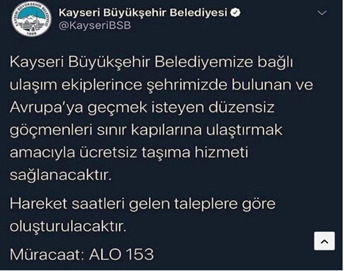
Image (3) the tweet posted by the mayor of Kayseri. Credit: ER HABER website.
Turkey’s state-run TRT channel, published on its official Twitter account on February 28, 2020 what it said an illustrative map of the routes used by refugees to access from Turkey to France and other European countries.[10]
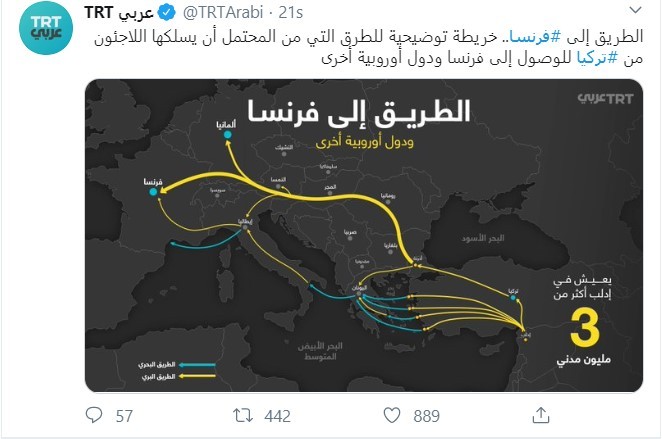
Image (4) a photo tweet published by TRT illustrates the illegal routes used by refugees. Credit: TRT’s official Twitter account.
For its part, Bab al-Salam border crossing of the Syrian Interim Government published a post, on March 3, 2020, showed a coordination between the Syrian opposition and the Turkish government, it said:[11]
“To our Syrian people in Turkey, a Turkish official stated that land and sea routes have been opened for those who wish to take refuge in Europe; and that not required travel permissions.”
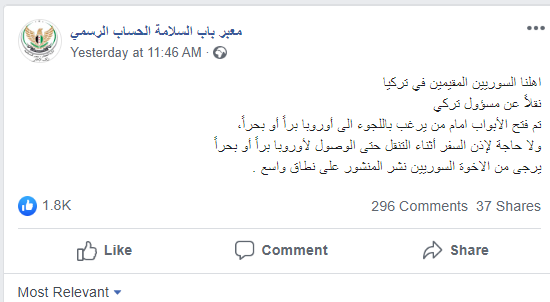
Image (5) the tweet published by Bab al-Salam border crossing. Credit: Bab al-Salam’s official Facebook page.
2. Facilitating the passage to the Turkey-Greece border:
On the very day after the statements were released, large numbers of asylum-seekers, among them Syrians and refugees of other nationalities (Iraqis, Afghans and Iranians, some sources reported that among them there were also Turkish), headed to the city of Edirne at the Turkey-Greece border. Asylum-seekers were transported by buses for free from key areas throughout Istanbul, (the districts of Fatih, Zeytinburnu, Aksaray and Esenyurt).
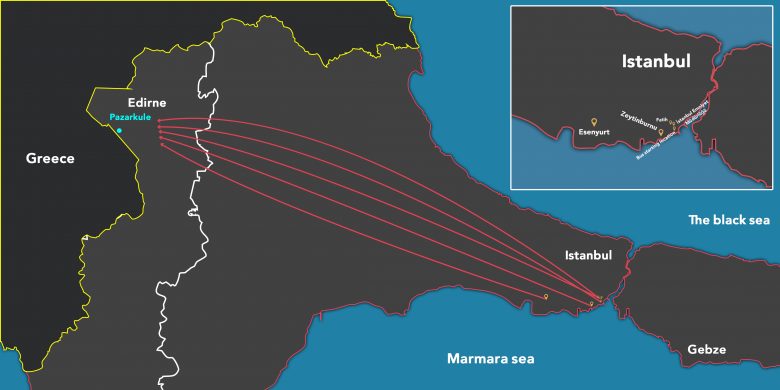
Image (6) a satellite image illustrates the departure points of the buses in the aforementioned districts.
After a field trip in Fatih, STJ field researcher reported that dozens of asylum-seekers crowded near the Turkish Department of Immigration (Emniyet Fatih) in Watan street, in order to get into the buses which would transfer them to the borders. The bus services for refugees to the border with Greece was offered for free by the municipality of Istanbul, as confirmed by the buses’ drivers who said that they had been paid for this by the municipality.
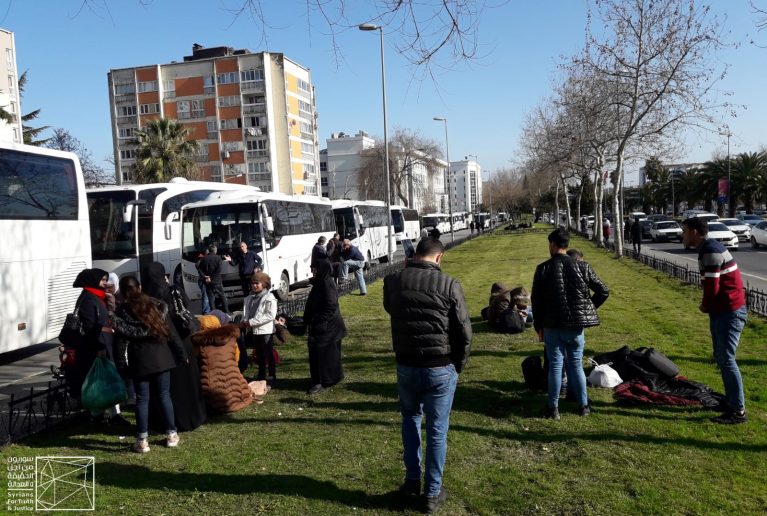
Image (7)
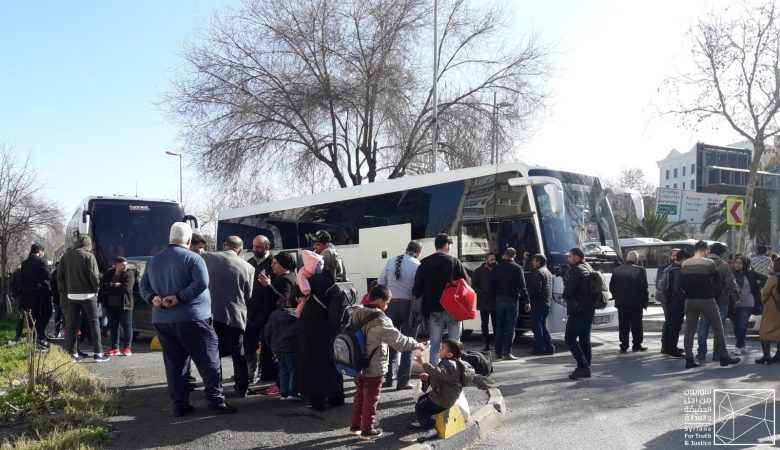
Image (8)
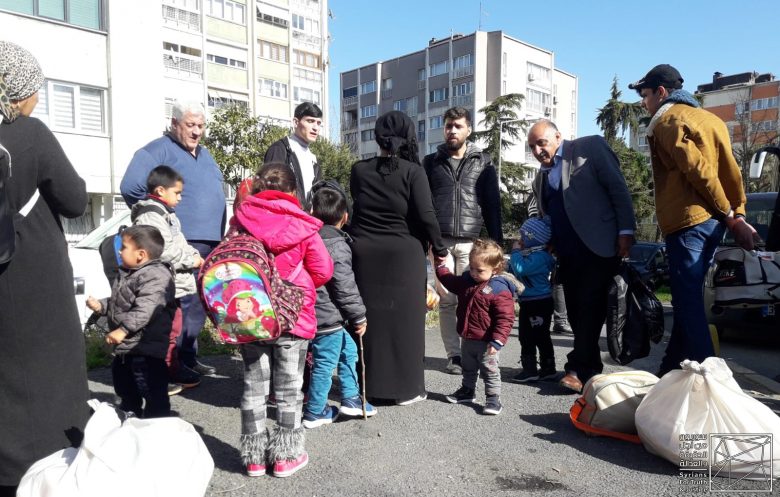
Image (9)
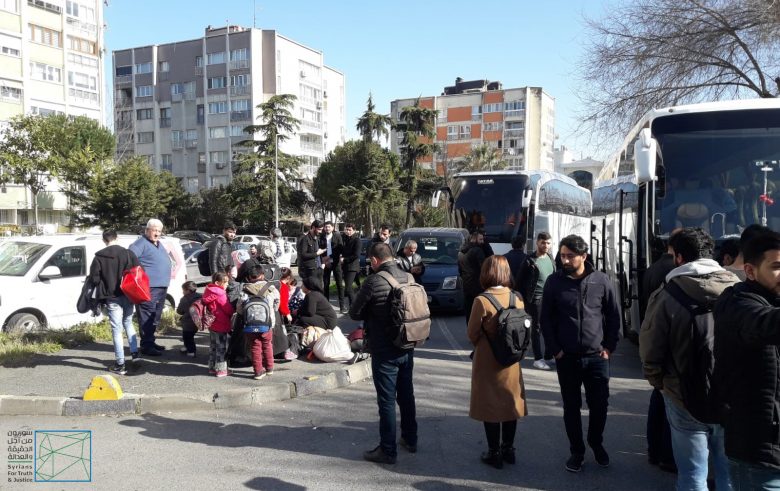
Images (7), (8), (9), (10) show buses, dedicated to transport refugees to Edirne for free, in Fatih district. Credit: STJ.
In confirmation of the above, the Turkish TV100, broadcasted a video, on February 28, 2020,[12] in which its correspondent said at (0:20):
“We are now in the Fatih district near the Turkish Department of Immigration, where dozens of refugees have gathered to travel by bus to the border city of Edirne.”
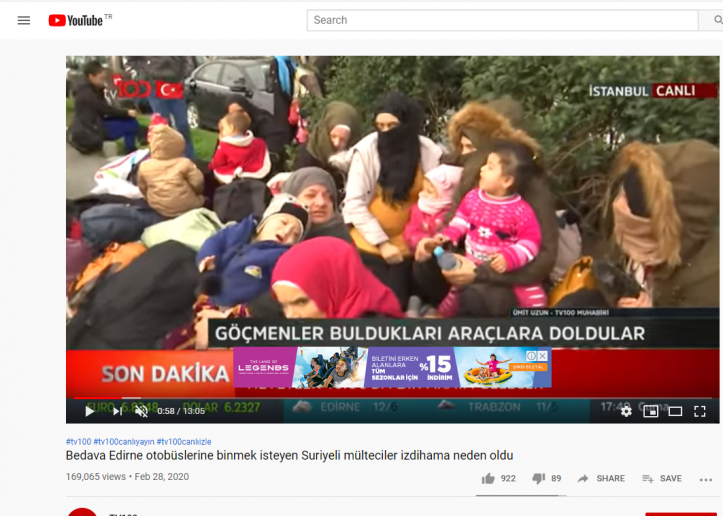
Image (11) a screenshot from the aforementioned video, shows refugees waiting near the Turkish Department of Immigration in Fatih to get on buses.
STJ field researcher talked to three of the asylum-seekers who came from different Turkish cities to Fatih to get into the free buses to Edirne, and discern that the Turkish government had much facilitate their transfer, as they were allowed to travel without permissions and some even without Kimliks.[13]
Our researcher conducted interviews with several asylum-seekers, who had come to Turkey a year or five years ago and they all said that they wanted to seek a better life in Europe, so they didn’t hesitate to head to the borders after the road was opened, leaving everything behind.
Mahmoud M., 25, a refugee from Eastern Ghouta, traveled from the city of İzmir to Istanbul and then to Edirne on February 29, 2020, without obtaining a travel permission or even holding a Kimlik. Mahmoud had escaped the war in Syria towards Turkey in mid-2019 after being released from the regime prisons-in which he spent three years- aiming at better and safe life, he said:
“I had gone through hell before I managed to access Turkey illegally. And as soon as I arrived here, the Turkish government started deporting illegal refugees and stopped the issuance of Kimlik cards in many Turkish states. Since then I have been trying to regulate my legal status which impedes me from living properly and finding a job. When I heard the statements and news circulated about the Turkish government’s decision to let refugees into Europe, I rushed to Istanbul by a taxi without having a travel permission or even a Kimlik. However, checkpoints on the road let me go as they heard that I was heading to Edirne without requesting me to present any document, which is unusual. Then, I got a paid bus from Fatih to Edirne, since those free buses were so crowded.”
Fatima D., 50, from Raqqa, told STJ that, on February 29, 2020 she come from the city of Urfa to Istanbul and then bounded to Edirne, by bus, without obtaining a travel permission, she said:
“I came to Turkey with my daughter’s family in 2015, and we obtained Kimlik cards from the city of Urfa. Here, Syrians have very difficult conditions of life and work, as the job pays are very low. Therefore, we didn’t hesitate to bound towards the Turkish borders with Greece after the government opened the doors for migration. We turned over the house we were dwelling in to its owner and sold all the stuff in it and booked tickets to Istanbul. It was the first time we travel without issuing travel permissions, which made us certain that the borders would inevitably open.”
The third witness Omar D., 30, had been in Turkey for about a year. He had come from Mersin to Istanbul and then to Edirne on February 29, 2020. He also assured STJ that the checkpoints of the Turkish government that stopped the bus he was boarding, didn’t investigate into his legal status or that of any other Syrians on the bus, especially that he and three others didn’t have Kimliks or travel permits.
The fourth witness Bassel Kh, 45, from the city of Aleppo, said that he tried to cross into Greece on March 1, 2020, with his wife and two children (one year and six years of old). Bassel had been in Istanbul since 2017. He used to work in a tailoring shop, but has been suspended after the Turkish authorities started conducting searches for illegal refugees. Since then, he became unemployed and no longer able to support his family, added to this, his Kimlik registered in a city other than Istanbul. These reasons were what motivated him to try to cross to Greece with his family, after he heard the news of opening the doors of immigration for refugees, he said:
“On February 29, 2020, on my way home, I was stopped in the metrobus station by Turkish policemen. They told me to present my Kimlik, and when they saw that it is registered in the city of Urfa, they told me that I must pay a fine or go to Urfa and live there or to cross the borders to Europe. When I told them that I would wait until I made sure that the Greek border was opened, they threatened to deport me to Syria. So, the next day I handed over the house I dwelled to its owner, and went to Fatih to got into a free bus to Edirne. I will never return to Turkey; either to die on the border or to cross into Europe.”
3. The real numbers of refugees who crossed the Turkey-Greece border:
Information-based on sources of varying type-obtained by STJ field researcher, along with observations made by him, confirmed that it is not possible to determine with certainty the number of asylum-seekers bounded to the border city of Edirne, especially the number of those came from Istanbul, considering that no entity registered their names, their numbers, their legal status or nationality. However, STJ field researcher said that those who headed to Edirne may number in the thousands, and that among them there were people of nationalities other than the Syrian (Afghans, Iranians, Iraqis and Turks).
This information was reaffirmed by a declaration made by the International Organization for Migration, on March 2, 2020, in which it confirmed the observation of 13.000 people massed at the official borders between Bazarköle (on the Turkish side) and Epsala (on the Greek side) after Turkey said that it will not stop Syrian refugees from reaching Europe.[14]
However, in a statement to CNN Türk TV., on March 4, 2020, Süleyman Soylu gave information contravened the abovementioned, saying that more than 130.000 asylum-seekers reached the border city of Edirne, only 25% of them were Syrians.[15]
In this regard, Qais Al-Ahmad, a media activist who reported on the situation of refugees heading towards the borders, from February 28 to March 7, 2020, said to STJ:
“During the first two days; 28 and 29 February, large numbers of asylum-seekers, estimated at thousands, flocked to the Turkey-Greece border. In the subsequent days, however, the number decreased, since the situation at the borders was dire; many refugees set tents in Bazarköle border crossing without any sanitary facilities like toilets, and with the inadequate shelters, many families slept in the open. The Turkish organization IHH, provided one meal a day which is not enough, and to make things worse, Turkish gendarmerie prevented refugees from returning to Istanbul, forcing them to walk long distances in the dark and the harsh cold, to escape.”
A consistent statement was given by a female media activist, who also covered the flow of asylum-seekers towards Turkey’s borders with Greece in the period from February 28 to March 8, 2020, as she said that the number of asylum-seekers who crossed the Turkey-Greece border, on 28 and 29 February 2020, reached thousands, but these numbers did not rise much in the following days, due to the bad humanitarian situation there on the border, she added:
“Since the first day, I tried to tell refugees that the journey to the borders is arduous and isn’t for children and women. But apparently, the poor living conditions of many asylum-seekers pushed them to risk their own lives and the lives of their family members to seek a better life. I met Iraqi, Afghan and Iranian asylum-seekers, and I learned by listening to several refugees that they had been looted and robbed while on the Turkey-Greece border. In addition to that, some families lost their children in the crowds, and searches were conducted to find them.”
In this context, on March 7, 2020, a TV. channel aired a video showing tents of asylum-seekers at a gathering point on the Turkish-Greek border, saying that there are more than 13.000 asylum-seekers at this point staying in the open since more than 10 days.[16]
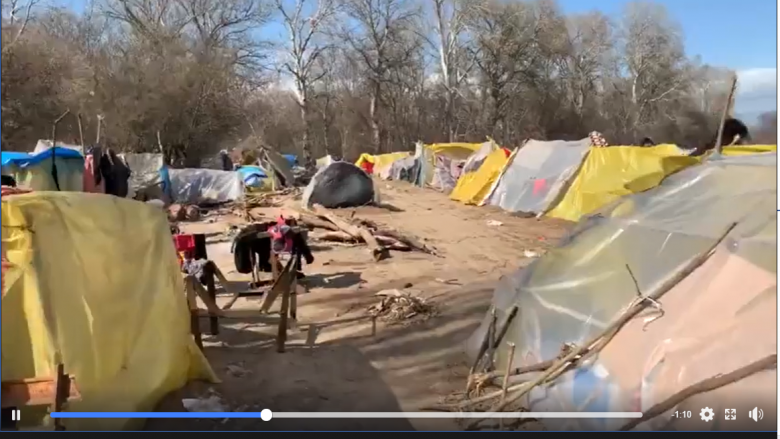
Image (12) a screenshot from the abovementioned video shows a side of refugees’ tents on the Turkish-Greek border.

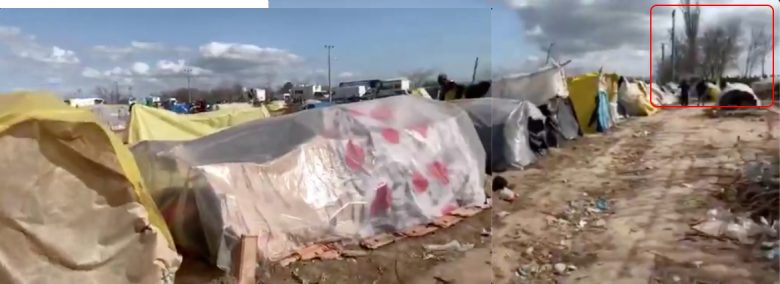
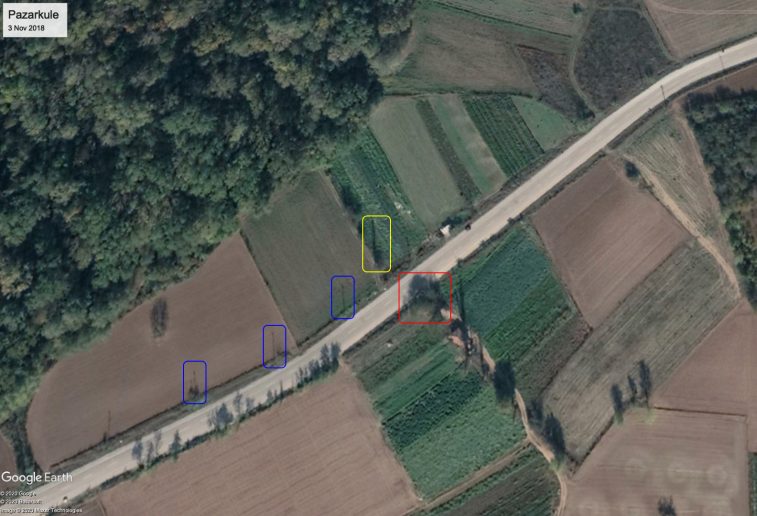
Image (13) a visual analysis of a gathering point on the Turkish-Greek border, shown in the abovementioned video.
4. Pushing refugees to take the unsafe journey to Greece again:
During his field trip in the Turkish-Greek border, on March 1, 2020, STJ field researcher met ten asylum-seekers, five of whom confirmed that the Turkish authorities facilitated their passage to the Turkish-Greek border, and that upon their arrival to Edirne the Turkish gendarmerie guided them to the border points through which they can cross into Greece, including (The Bazarköle crossing and the river separating the two countries in the town of Apsala). The Turkish gendarmerie distributed them to these points, and provided them with rubber boats, and boats of fishermen, to cross the river toward Greece, in exchange for 100 Turkish liras per person.[17]
Many refugees confirmed seeing people smugglers at the border points making deals with thousands of asylum-seekers who gathered there, in full view of the Turkish gendarmerie.
Several statements of asylum-seekers met at the Turkish-Greek borders confirmed that while facilitating their access to Greece borders, the Turkish gendarmerie prevented them from returning to Istanbul and other Turkish cities by force. Many of those who failed to access into the Greek territories, including women, told STJ that they underwent or witnessed beatings and threats by the Turkish border gendarmerie when trying to return back to Turkey.
Besides, two eyewitnesses confirmed that the Turkish border guards used beatings to force many of the asylum-seekers who returned from the Greek side after being beaten by the Greek border guards, to go there again.
Mohammad 30, a refugee from Damascus countryside, was one of those beaten by the Turkish and the Greek border guards as well on February 29, 2020. He told STJ that the Turkish border gendarmerie pushed him and other asylum-seekers, by force, to try crossing into Greece again after the failure of their first attempt in which they were severely beaten by the Greek border guards, he said:
“I had been in Istanbul for about two years, where I worked in a tailoring shop with little pay, which was not enough to support my family living in Damascus countryside, as I am their sole breadwinner. In addition, I hold a Kimlik registered in a city other than where I live, which made me live in fear of arrest and deportation. So, as soon as I heard about opening the immigration door to Europe, I went to the Aksaray district where I got into one of the free buses, which was loaded with dozens of asylum-seekers.”
Mohammad added:
“When we arrived at the border city of Edirne, the driver asked us to get off the bus in an empty area, which is away from the Turkish-Greek borders, so we had to go there by walk. Thugs got into our way and robbed our money and belongings except for the cell phones. After an hour-long walk, we reached a gathering point on the Turkish-Greek border, where we tried to tell the Turkish police about the thugs, but they did not give us an ear, and told us to go and stay in the shelters scattered in the area. I asked my relatives to send me some money. The next day Turkish soldiers gathered hundreds of refugees, including women and children, in order to take them to a border crossing point, asking each of those who wanted to cross the river between the two countries, to pay 100 Turkish liras for getting on a rubber boat they provided; indeed we paid that amount, and got on a boat.”
Mohammad said that all their attempts to cross into the Greek territory failed, as they were severely beaten, robbed and undressed by the Greek police before being sent back to Turkey. In turn, the Turkish gendarmerie pushed them back to Greece with beatings and threats.
Nour M., 23, from Damascus countryside, was also beaten by the Turkish gendarmerie, when she refused to try to cross into Greece again. She headed to Edirne on February 28, 2020, prompted by the Turkish officials’ promising statements, she said:
“After the failure of our first attempt to cross into Greek territory, we were sent back to Turkish territory, where we saw a number of people smugglers, who offered to help us cross to Greece for money, but we refused. The strange thing is that the smugglers were standing near the gendarmerie, without any fear from them. The next day I decided to return to Istanbul along with other asylum-seekers, but the Turkish gendarmerie did not allow us back. However, we were forced to get on buses in order to be driven to another border point. Then, I started screaming and crying and refused to board the bus, so one of the soldiers slapped me in the face and kicked me on the stomach, and eventually forced me to get on the bus.”
Nour managed to escape from the grip of the gendarmerie with other asylum-seekers, and took a walk of one hour and a half towards the town of Apsala where she hired a taxi for 1500 Turkish Lira to drive her to Istanbul on the condition of not passing through checkpoints.
Fatima D., 50, her daughter Rana, 25, and her baby granddaughter were among those headed to Edirne in the free buses from Fatih district on February 28, 2020, aiming to cross into Greece. Fatima told STJ her story and how the gendarmerie prevented her from returning to Istanbul, saying:
“We had fled Aleppo to Istanbul about a year ago, but we decided to leave it to Europe prompted by our difficult living conditions and the fact that we can’t obtain Kimliks. We don’t have a breadwinner, my husband died several years ago, and my daughter Rana worked in a beauty center, for a small salary, so we decided to venture and seize this opportunity, which may not recur. As soon as we arrived in Edirne, the Turkish gendarmerie started assembling us in order to be sent to one of the border points between the two countries and specifically to the river separating them. However, the Greek police pushed us back after taking our belongings and beating us. When we lost any hope of accessing Greece, my daughter decided to return to Istanbul by taxi and told him that we would pay him as soon as we got there. On the way back, a checkpoint of the Turkish army stopped us- we were still in Edirne-, and sent us back to the same border point, but we were very tired, and couldn’t try to cross to Greece again.”
Her daughter Rana also gave a statement saying:
“We had strongly hoped to cross into Greece and reach one of the EU’s rich countries to live a safe life. But it never occurred to us that we would be beaten and robbed by the Greek border guards, or to be forced by the Turkish gendarmerie to sleep in the open in order to try to cross into Greece again. We had no choice but to comply, for fear of beating and arrest, until we finally managed to hire a taxi, with the help of someone, who agree to take us to Istanbul without passing through the military checkpoints.”
In this context, on March 8, 2020, media activists circulated a video,[18] showing a member of the Turkish gendarmerie, threatening to use his pistol on a bus loaded with asylum-seekers, including women and children, when they refused to get off the bus and ride a boat to Greece, as he ordered them.
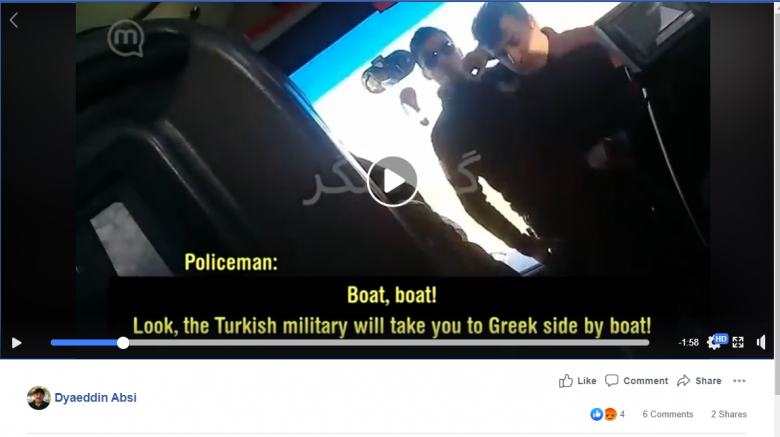
Image (15) a screenshot from the abovementioned video shows a member of the Turkish gendarmerie threatening refugees at gunpoint to get off the bus.
Ammar M., 35, from Damascus, was among the refugees headed to Edirne on February 29, 2020, though being nominated for the Turkish citizenship. Ammar came to Istanbul in 2016, and used to work there in sales. The insecurity he felt after Turkey started deporting Syrians and the resulted discrimination, prompted him to take the risk and access into Greece, he said:
“When we heard the statements of Turkish officials about opening the doors of immigration to Greece, me and my friend decided to go to Aksaray, and got in one of the many buses stopped there to transport those wishing to head to Europe. Our bus along with four other buses carrying dozens of refugees, including families, headed together to Edirne. When we arrived at the entrance to the city, a Turkish military checkpoint stopped us, waited until other buses loaded with refugees arrived, and then allowed us to complete the journey. A car belonging to the Turkish gendarmerie, headed the column of buses guiding them to a border point near the town of Apsala. They removed us from the buses in an abandoned area and prevented us from filming, and then took us to one of the gathering points on the Turkish-Greek border, where we saw some refugees setting fire to get warmed. However, we planned to conduct our first attempt to cross the border the next morning.”
The witness continued that he decided to refrain from trying to cross into Greece the next day, due to what he was told by many Syrian who had already tried and were severely beaten by the Greek border guards before being expelled to Turkish territory. Given the seriousness of the conditions, Ammar decided to return to Istanbul with his friend, but they were prevented by the Turkish gendarmerie -along with other refugees- to do so. Thus, Ammar and his friend falsely told the gendarmerie that they are reports, so they were allowed to return.
5. Heading to the borders though nominated for Turkish nationality:
In his field trip, STJ field researcher met Ammar and Yasser N., 37, who were nominated to obtain the Turkish nationality. Yasser hails from Aleppo countryside and he is married with five children. He had been displaced to Gaziantep since 2015, and has left the Turkish-Greek borders recently following the news of opening the borders. With his cousin’s seven-member family, Yasser and his family headed to Istanbul and from the district of Aksaray they got into one of the free buses bounded to Edirne, he said:
“In 2016, my family and I tried to cross to Europe via smuggling routes, but we failed. Then I was nominated for Turkish citizenship, so I decided to settle in Turkey, but life here is very difficult and I do not think that obtaining Turkish citizenship will make our conditions much better. so, when I heard about opening the immigration door to Europe, we decided to go to the border city of Edirne, where we spent a night in the bitter cold, and when we saw many refugees failing to cross, we lost hope and decided to return.”
6. The use of excessive force by the Greek border guards
For its part, the Greek authorities prevented asylum-seekers from crossing into their lands, using excessive force. Eyewitnesses and asylum-seekers met by STJ field researcher in Edirne border region confirmed being beaten, robbed, and undressed by the Greek border guards, when they tried to cross into their country. This followed an announcement by the Greek prime minister Kyriakos Mitsotakis on February 29, 2020, in which he said: “No illegal entries into Greece will be tolerated, pointing out that security measures have been tightened on the land and sea borders.[19]
On March 6, 2020, a media activist tweeted photo of refugees taken after their return from the Greek borders, where they were beaten and undressed by the border guards.[20]
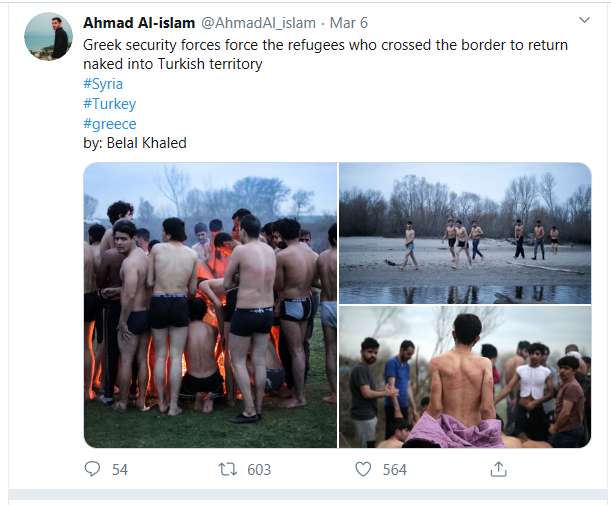
Image (16) a photo tweet posted by a media activist shows refugees after returning to Turkey from an attempt to cross into Greece.
7. A decision to stop migrants from crossing the Aegean Sea to Europe:
Only a day after Turkey’s Erdoğan agreed ceasefire in Syria’s Idlib with Russia’s Putin, [21] on March 5, 2020; the Turkish coast guard declared the stop of migrants from crossing the Aegean Sea to EU saying in a tweet: “refugees in Turkey will be stopped from crossing the Aegean Sea towards Europe, as ordered by president Erdoğan and under the supervision of Süleyman Soylu.”[22]
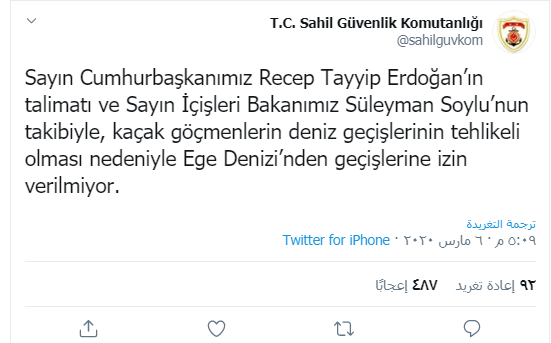
Image (17) a tweet by the Turkish coast guard on stopping refugees from crossing the Aegean Sea towards Europe.
According to sources, after Russia and Turkey agreed a ceasefire deal in Idlib, the Turkish government started allowing the asylum-seekers massed at the Turkey-Greece border to return to the Turkish cities they dwell in. and on March 8, 2020, the Turkish government stopped the free bus services to the borders with Greece and prevented new asylum-seekers from entering Edirne, as reported by media activists who covered the situation at the borders. The activists said that many asylum-seekers preferred to return after they had lost hope in any possible way to cross into Greek territory, while others are still waiting at the Turkey-Greece border in order to try again, as of March 17, 2020.
[1] (Turkish: Cumhuriyet Halk Partisi Gençlik Kolları or CHP Gençlik Kolları).
[2] The witness was interviewed online by STJ field researcher on March 7, 2020.
[3] The activist was interviewed online by STJ field researcher on March 8, 2020.
[4] “Martyrs of the Turkish army in Idlib increased to 33”, Anadolu Agency, February 28, 2020. (last visit: March 3, 2020), https://www.aa.com.tr/ar/تركيا/ارتفاع-عدد-شهداء-الجيش-التركي-بإدلب-لـ33-جنديًا/1747843 .
[5] “Turkey says it will let refugees into Europe after its troops killed in Syria”, Reuters, February 28, 2020, (last visit: March 3, 2020), https://www.reuters.com/article/us-syria-security/turkey-says-it-will-let-refugees-into-europe-after-its-troops-killed-in-syria-idUSKCN20L0GQ.
[6] “Erdoğan: We will keep our doors open for refugees heading to Europe”, Anadolu Agency, February 29, 2020, (last visit: March 9, 2020), https://www.aa.com.tr/ar/الدول-العربية/أردوغان-سنبقي-أبوابنا-مفتوحة-للاجئين-الراغبين-بالتوجه-لأوروبا-/1749701?fbclid=IwAR1ak6dlflCs1XchqKP23tvhFbChYro-rIjcwIJNruZoZQ9UGrDAXARVPJg.
[7] “İçişleri Bakanı Süleyman Soylu CNN TÜRK’te”, CNN Türk, March 4, 2020, (last visit: March 9, 2020)
https://www.cnnturk.com/turkiye/icisleri-bakani-suleyman-soylu-cnn-turkte010403.
[8] For more info see: https://twitter.com/tanjuozcanchp/status/1233395287705706498.
[9] For more info see: https://www.erhaber.com/akpli-belediyeden-sinira-ucretsiz-otobus-126510.
[10] For more info see: https://twitter.com/TRTArabi.
[11] For more info see: https://www.facebook.com/BABALSALAMAH1/posts/2967742233285889?__tn__=-R
[12] For more info see: https://www.youtube.com/watch?v=UvQb0UBxdQY.
[13] “Thousands of Syrians Forcibly Returned to Peril”, STJ, June 29, 2019, (last visit: March 18, 2020), https://stj-sy.org/en/turkey-thousands-of-syrians-forcibly-returned-to-peril/.
[14] “No ‘Legal Basis’ for Greece to Suspend Asylum: UNHCR”, UN, March 3, 2020, (last visit March 9, 2020) https://news.un.org/ar/story/2020/03/1050321
[15] “İçişleri Bakanı Süleyman Soylu CNN TÜRK’te”, CNN Türk, March 4, 2020, (last visit: March 9, 2020)
https://www.cnnturk.com/turkiye/icisleri-bakani-suleyman-soylu-cnn-turkte010403
[16] For more info see: https://www.facebook.com/syrtelevision/videos/3589980224407868/?vh=e.
[17] STJ field researcher said that the Turkish gendarmerie prevented from photographing upon his arrival at the Turkish-Greek border.
[18] For more info see: https://www.facebook.com/dyaeddin80/videos/3581067918633435/?d=n
[19] “Search Results Web results Syria war: Turkey lets refugees exit towards Europe”, BBC, February 29, 2020, (last visit: March 10, 2020), https://www.bbc.co.uk/news/world-europe-51678462
[20] For more info see: https://twitter.com/ahmadal_islam/status/1235902739999264768?s=21.
[21] “Erdoğan: a ceasefire in Idlib while preserving the right to retaliate against the regime,” Anadolu Agency, March 5, 2020, (last visit: March 10, 2020), https://www.aa.com.tr/ar/تركيا/أردوغان-وقف-إطلاق-نار-في-إدلب-مع-احتفاظنا-بحق-الرد-على-النظام-/1756263
[22] For more info see: https://twitter.com/sahilguvkom/status/1235930478785503232.

